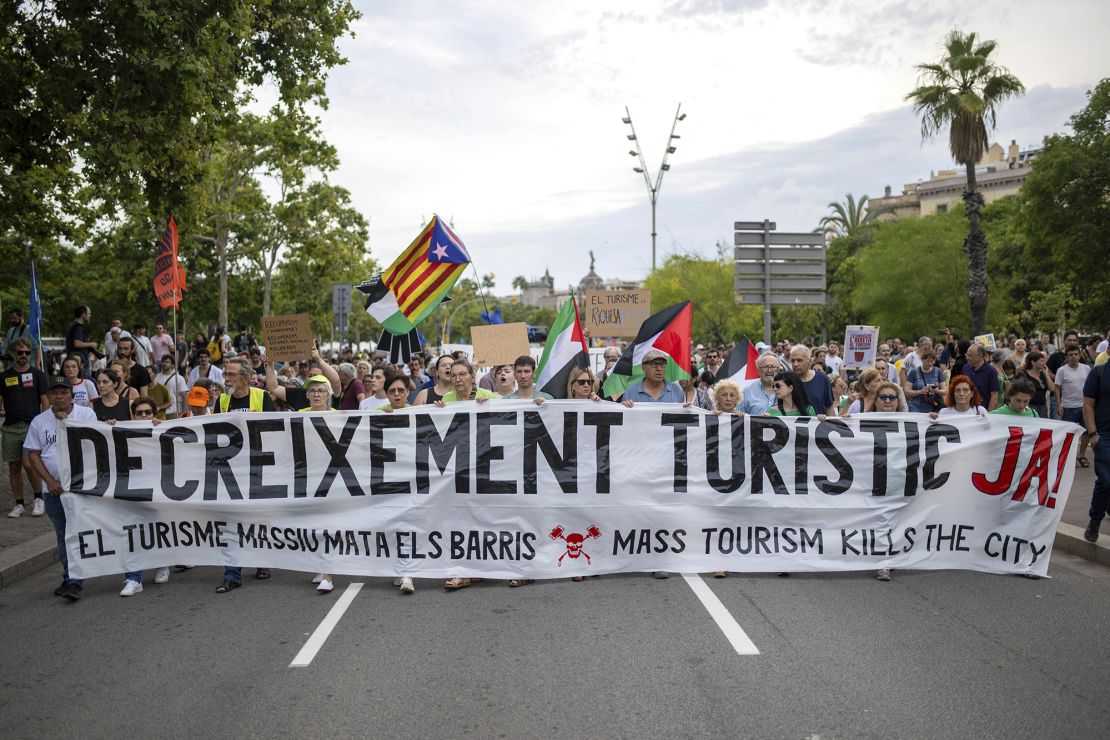Tourism increases in Barcelona have had a huge impact on the population living here. Some have been good while others have caused many problems. Benefits include the role tourists play in the economy, for instance, increased job incomes and increased infrastructure of common places such as train stations, airports and more. Some disadvantages include overcrowding in public spaces, increases in rent and housing, and taking care of the city like cleaning the streets or the overuse of water.
Since COVID-19, tourist numbers have yet again surged, but this time there are even more than before. In 2018 Barcelona welcomed 12 million people and in 2023 we had 15.6 million tourists. During the 5 years there was a decrease in 2020, with 2.2 million tourists, then slowly increased back in 2022. In 2023, there were 3 reasons why people travelled to Barcelona. Of the people that came, 69.1% wanted to relax and visit the city, 18.9% came for work, 12% came for personal reasons. This year, an estimate of 90 million people came to visit Barcelona with varying reasons for their visits.
Now you might be wondering what Barcelona offers that is so special and iconic to outsiders? Well firstly, the architecture of the buildings are very unique, just taking a stroll through the city centre you see apartments with small details that make such a huge difference and impress passersby. Secondly, the culture and food. One thing that I always hear from not only tourists but expats all the time is how delicious the food tastes. The festivals and events from the country’s past play a major role in influencing the amount of tourism, some events include Sant Jordi where the city is full of roses, and Sant Joan which is the welcoming of summer with fireworks and a variety of firecrackers. They are also attracted by all the famous landmarks and areas like Tibidabo, Plaça Catalunya, Parc Güell, Plaça Espanya and so many more. A few well known buildings and places are La Catedral de Barcelona, La Rambla which is a long pavement in the middle of a street full of mini stores and catalan restaurants, and the most visited place, La Basilica de Sagrada Família which is an immense temple architecture by Antoní Gaudi that started construction in 1882 and has still not been finished.
As I said in the beginning, even though Barcelona continues to struggle with problems caused by tourists, the city has also benefited from it. It is the 3rd most visited country in Europe. The surge in tourism began in 1992, when Barcelona hosted the Olympic Games, since then it has gained lots of fame. The positive impact the tourists have caused is best seen in the economy of the city. Not only is this one of the most famous cities but it is also home to the number one cruise port in Europe. Around 257 million euros were added to the city’s economy, due to more than 3.7 million passengers moving through the city’s 7-terminal cruise port in 2015. In 2023 visitor spending added 9.6 billion euros to the economy—26% higher than 2022 and 15% more than the spending in 2023. All of this impact on the economy was able to increase job wages and improve infrastructure like airports, fixing roads and keeping them clean, and upgrading the train stations and railways in Barcelona and its surrounding suburbs. This was able to improve the experience for tourists and also the everyday life of locals living in Catalunya.
Now that I’ve stated the benefits of all this tourism and fame, let’s take a look at a few disadvantages. Firstly, the main problem Barcelona faces with tourism is overpopulation and the amount of visitors in general. The locals living in this city and the people who work for the government keeping the city clean, are losing their patience. David Habtemariam stated in an article, “Barcelona, one of the world’s most popular destinations, just got a rude awakening about how it manages tourism”. Recently there have been many protests in common places and people graffitiing “tourists go home” on walls throughout the city, but that’s not the only problem the tourism is introducing. The city council have been debating increasing tax prices from €3.25 to €6 so that they can balance the budget. The mass tourism is also starting a housing crisis, landlords now have to sell their apartments for short-term occasions because of the hotels being fully booked. There are currently ten thousand authorised tourist apartments, but there are so many more illegal apartments still shown on rental platforms.
Now, you may be thinking, why not kick the tourists out? But it’s not as simple as that, I wish it were. The mayor of the town has been trying to find solutions and has been thinking about cutting down the amount of cruises, trains, planes and any other form of transportation from outside countries entering Barcelona. Although this is just a small fix, it can help people realise the damage being done to the city and maybe if the amount of tourists increases again, things will be different. As stated before the city’s council wants to increase taxes and make the city “more expensive” so that less people come to visit while still maintaining the economic level. While not a very effective idea, it still has merit and is a welcome way to make better solutions.
In conclusion, I think Barcelona’s way of handling the overpopulation and visitors isn’t going to work because people will continue to complain about everything such as not having enough transport out of the city or country from Barcelona or might complain about the overpriced taxes.
Bibliography:
“Barcelona residents protest against mass tourism.” Le Monde, 7 July 2024, https://www.lemonde.fr/en/economy/article/2024/07/07/barcelona-residents-protest-against-mass-tourism_6676892_19.html. Accessed 29 October 2024.
“Barcelona Tourism Statistics – How Many People Visit? (2023).” Road Genius, 22 July 2024, https://roadgenius.com/statistics/tourism/spain/barcelona/. Accessed 29 October 2024.
Cunningham, Courtney. “Tourism In Barcelona Statistics 2024: Your In-Depth Travel Guide.” GoWithGuide, 12 July 2024, https://gowithguide.com/blog/tourism-in-barcelona-statistics-2024-your-in-depth-travel-guide-5731. Accessed 29 October 2024.
Habtemariam, Dawit. “’Tourists Go Home’: Global Movement Against Over-Tourism.” Skift, 8 July 2024, https://skift.com/2024/07/08/tourists-go-home-barcelonas-protests-against-overtourism/. Accessed 29 October 2024.
“In Barcelona, Locals Fight Overtourism Armed With Water Guns.” Forbes, 11 July 2024, https://www.forbes.com/sites/ceciliarodriguez/2024/07/10/in-barcelona-locals-fight-overtourism-with-water-guns/. Accessed 30 October 2024.
Macola, Ilaria Grasso. “Has Spain’s patience with mass tourism snapped? And why now?” TTG Media, 29 July 2024, https://www.ttgmedia.com/sustainability/has-spains-patience-with-mass-tourism-snapped-and-why-now-47590. Accessed 29 October 2024.
Mas, Xavier. “My Barcelona is being destroyed by mass tourism – but kicking visitors out isn’t the answer | Xavier Mas de Xaxàs.” The Guardian, 19 August 2024, https://www.theguardian.com/commentisfree/article/2024/aug/19/barcelona-mass-tourism-visitors-city-industry. Accessed 29 October 2024.
Nastase, Monica. 16th May 2016, https://www.linkedin.com/pulse/impact-tourism-barcelona-spain-monica-nastase/. Accessed 20th October 2024.
“Positive & Negative Impacts Of Tourism.” Bunnik Tours, https://www.bunniktours.com.au/sustainable-tourism/impacts. Accessed 29 October 2024.

